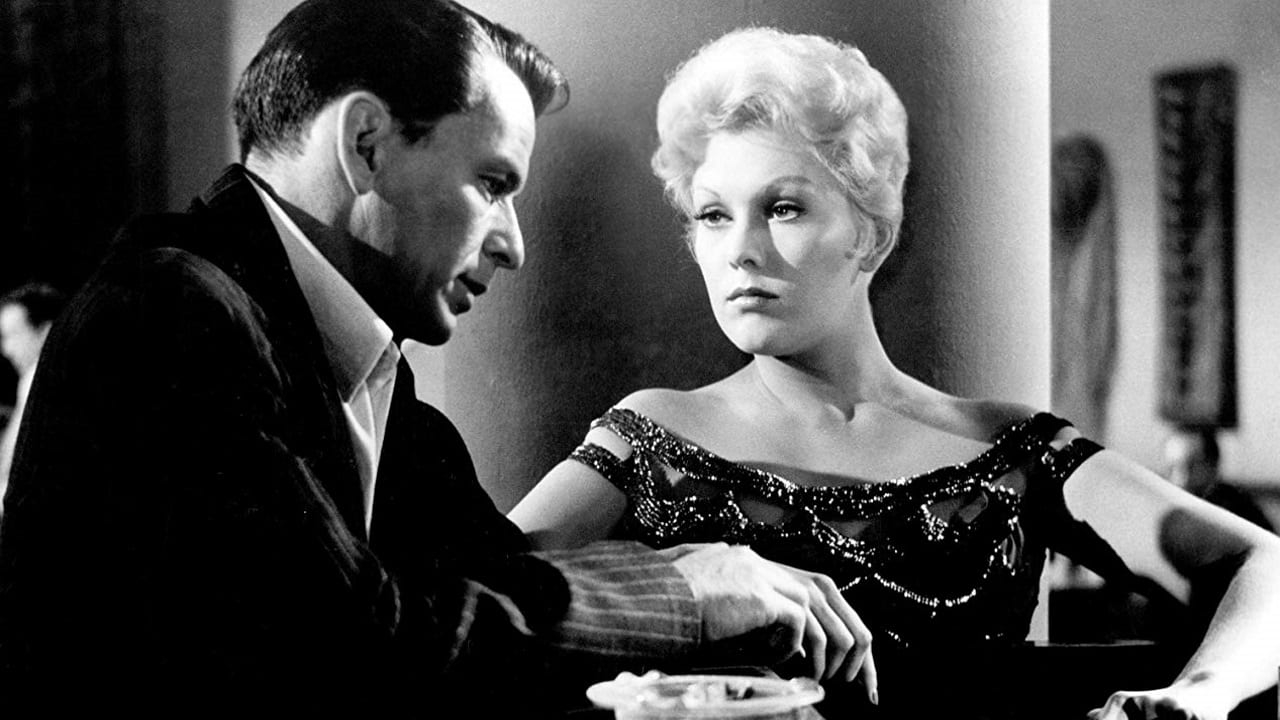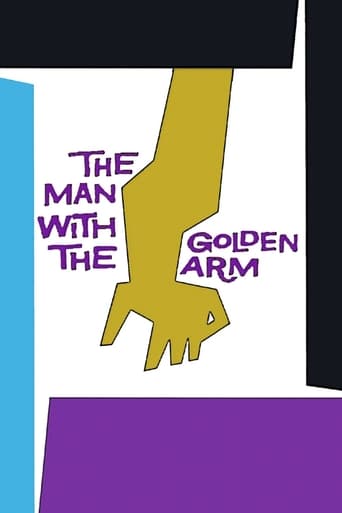



This movie is the proof that the world is becoming a sick and dumb place
View MoreAn absolute waste of money
Although it has its amusing moments, in eneral the plot does not convince.
View MoreI was totally surprised at how great this film.You could feel your paranoia rise as the film went on and as you gradually learned the details of the real situation.
View MoreWhen some see "The Man With the Golden Arm" today, they may find the film a big quaint. After all, some aspects of addiction are sanitized--everyone looks so middle-class, clean and white plus you never even heard WHICH drug he's using--though it would appear to be heroin. But, if you put it in context, this was a tough as nails and cutting edge film in 1955. And, for many reasons, it's well worth seeing.The film begins with Frankie (Frank Sinatra) returning to his home turf after a stay in the hospital. Exactly why and the rest of his back story comes out in a natural way through the course of the film. Apparently, he's an addict and when into rehab. However, there are many forces that seem to be pushing him to return to the addicted lifestyle, as Frankie foolishly returns to his old haunts. Two hoods (Darren McGavin and Robert Strauss) want him to return to gambling--and getting him hooked on the drugs once again will ensure this. He also has a very needy wife who is in a wheelchair--and you eventually learn that he only married her out of guilt--guilt because his driving resulted in her being hurt in an accident. What's to happen to Frankie?! There are two main reasons the film works so well. The film is very well written and often surprises you with its violence and dark mood. Also, I really marveled at Sinatra's performance--probably the best of his career. Seeing him go through withdrawal was painful but exceptionally well done. Folks familiar with his lightweight fare such as "Guys and Dolls" or "Oceans 11" would be best to remember that he also appeared in some really gritty films like "Suddenly", "The Manchurian Candidate" and "The Detective"--and he really could act. Overall, one of the best films about addition of its age--comparable in quality to the exceptional "Days of Wine and Roses" and well worth seeing. The only negative was the soundtrack--which was too often too loud and too repetitive--making it very invasive.
View MoreThis movie has dated.....and dated badly. The fact that the whole movie is made in the studio doesn't help. (Frank Sinatra did not like working on location). It has the feel of an old "Play of the Week" about it. The thing that sinks this from the very beginning is the terrible acting of Frank Sinatra. I got the feeling he was really trying----but you can act----or you cant act. Frank Sinatra was a great singer. But..he could not act. Kim Novak is very good in this, cautionary tale about drug addiction. In its day....The Man With The Golden Arm caused quite a stir....indeed it was one of the very first films to tackle this subject. The Lost Weekend starring Ray Milland, made a few years earlier is about alcoholism. It is vastly superior to this movie.
View MoreThis is a unique film whose story and origin marked the evolution of Frank Sinatra as an entertainer and elevated the status of its director, Otto Preminger, one of the most respected masters in Hollywood in the golden years. The Man with the Golden Arm is based on the controversial novel of the same name by Nelson Algren who had already tried previously to take his work to the silver screen. His attempt came to naught owing to its tough storyline and the harshness of some parts. The text by Algren was regarded by some literary critics as "a pessimist, negative novel", rating it as a "bitter, squalid chronicle of a heroin addict who goes back to his area after six months rehabilitation". When the first draft of the story was submitted, the text failed to get past the censors, arguing that the hyper-realistic recreation of heroin addiction was excessive for a movie filmed in Hollywood. John Garfield had bought the rights to the book, but owing to his decease he could not take the novel to the cinema. That's where Otto Preminger came in, interested in directing and producing the cinematographic adaptation of the novel by Algren. Preminger acquired the rights to the work and through his own producer Otto Preminger Films he started production of the film in association with Carlyle Productions with whom he had produced his previous film, Carmen Jones (1954) and with whom he would stay until 1960, the year in which Preminger shot the wonderful Exodus. United Artists agreed to distribute the film, lending the right amount of trust and seriousness required to successfully complete a production of this magnitude.After winning an Oscar for his supporting role in From here to Eternity (1953), Frank Sinatra fell into a deep depression owing to problems with his voice and the termination of his contracts with several musical producers. The star was not having a good time of it and he needed a shot in the arm, something to drive him forward, motivating him to shine again as brightly as in days of yore. At that time Sinatra was married to Ava Gardner and she was the one who spurred him on to prepare the role of Frankie Machine, a role which would help him re-emerge and hit the heights again. With Sinatra leading the cast, the name of the actresses who would accompany him throughout the film was yet to be decided, his disabled wife and his understanding lover. Otto Preminger chose two actresses with strong characters, very attractive and effective, namely Eleanor Parker, who had just triumphed in the amazing The Naked Jungle and Kim Novak, the star of Picnic.Frank Sinatra plays the part of Frankie Machine, a former drug addict who returns to his beloved Chicago after spending a spell at a detox center. Frankie comes back with one set idea: to join a jazz band as a percussionist. The doctors who treated him congratulated him on his progress and even Frankie himself is proud to have kicked the habit. His good friend Sparrow (Arnold Stang) celebrates his return and spurs him on to dedicate himself to jazz professionally, helping him in all he can. Sparrow will remain by his side, spurring him on so Frankie is happy. At the other end of the spectrum is Zosch Machine (Eleanor Parker), Frankie's bitter wife, confined to a wheelchair because of an accident. Zosch tries to convince Frankie to give up his musical dreams and devote himself to a more profitable occupation such as going back to his former profession as a high-stake poker croupier (hence the title, the "golden arm" dealing out the cards). Frankie still thinks his future lies in jazz and not in cards and he bitterly comments on the total lack of communication between him and his wife.Frankie is still dreaming about becoming the drummer with a big jazz band and during his efforts he re-encounters a former flame Molly (Kim Novak). To turn up for an audition he asks his friend Sparrow to get him a suit and good old Sparrow gets it roughly and readily, stealing it in the hope he won't be found out. Unluckily for them both, not everyone agrees that Frankie should be professionally dedicated to music and the police soon find out about the theft and Frankie and Sparrow end up in jail. His former employer Schwiefka (Robert Strauss), the organizer of underground poker games, takes advantage of the situation and offers to pay his bail if he works for him on a major poker game he is organizing. The Man with the Golden Arm, (Frankie's nickname as a croupier) has no other choice but to accept unless he wants his dreams to vanish overnight. After working days and nights long enveloped in smoke and alcohol, surrounded by characters of dubious morality, Frankie starts feeling the need to take heroin again and he doesn't feel confident of his skills unless he is under the influence of drugs. Beside himself, he attacks an old acquaintance, the drugs dealer Louie (Darren McGavin) and then goes on the run. The dealer recovers from the attack and goes out to look for Frankie to get his revenge. In his quest he ends up at Frankie's apartment and by chance discovers that his wife, Zosch, has been faking disability all along, and the latter, having been revealed, is obliged to act, triggering a series of dramatic events which will force Frankie to go back to a detox center, overcoming his addiction by abstinence and suffering.
View MoreAlthough dated in some ways, the man with the golden arm still packs a powerful punch. Yes, it is melodramatic and rather too stagey for modern tastes and there is a lot of scenery chewing from some of the actors, but this piece still has a level of intensity and integrity beyond what most films can achieve this days. Frank Sinatra, giving perhaps his finest performance, is magisterial throughout as Frankie Mahine, but it is in the druggy scenes where he is most convincing. Other characters are less well defined particularly Sinatra's 'comical' sidekick Sparrow, obviously thrown in to lighten the mood of what otherwise would be an overly bleak film. He is however merely an annoyance and detracts from the intensity more than anything. The script is probably rather too in love with its own metaphorical cleverness. The 'golden arm' angle refers not only to Machine's drumming ability and his love of injecting himself with heroin but his gifts as a card dealer. Incidentally it is hard to see what about Sinatra would make him so highly prized as a dealer; dealing cards is hardly a difficult activity. It suspect that he is a 'dealer' only because the writer wish to play on the card dealer/drug dealer ambiguity. Again, perhaps the theme of dependency is rather overplayed with the women in Machine's life all exhibiting some sort of co-dependent behaviour. Kim Novak has a parasitic boyfriend she cannot leave and Eleanor Parker (in a hysterical performance) is dependent on the sympathy she receives from an accident which apparently left her wheelchair bound. The ending is rather contrived too and obviously designed merely to bring the strands together but that should not deter the viewer from checking this remarkable film out.
View More